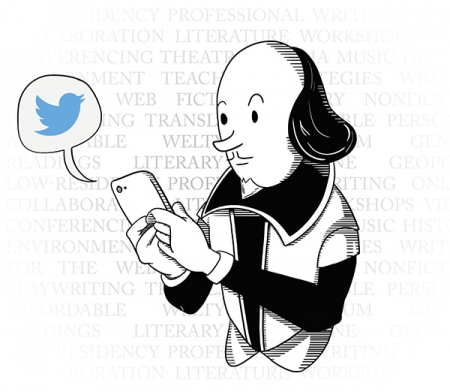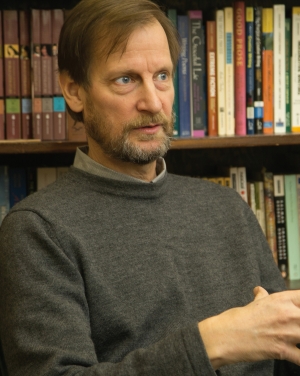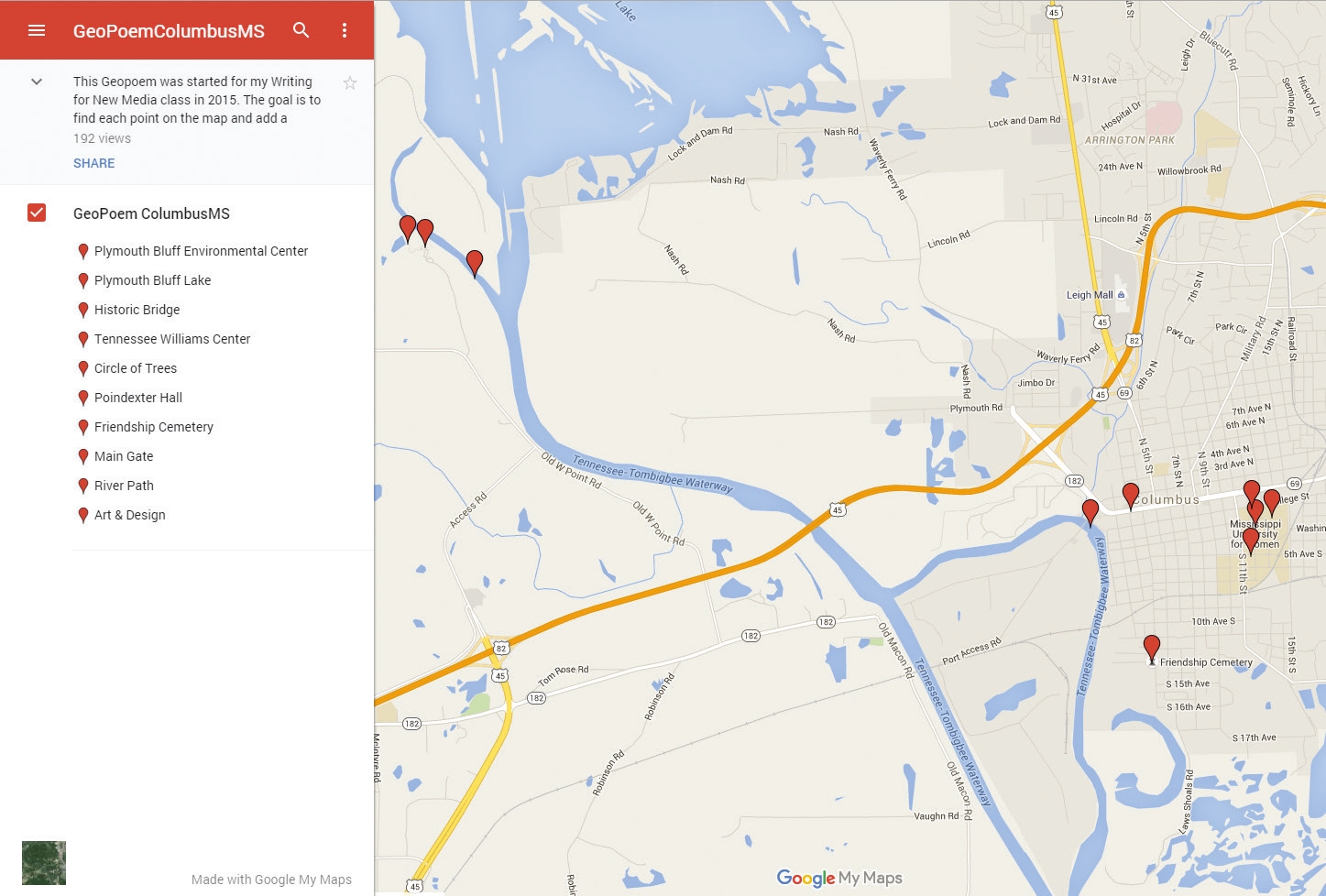A new approach to writing

Creating a poem in a social media platform restricted to 140 characters. Writing in an electronic medium with hyperlinks that take the reader to non-linear stories. Interacting with published authors and poets at the annual Eudora Welty Writers’ Symposium. These are some of the ways in which 11 graduate students in the university’s new master of fine arts in creative writing are expanding their skills, their thinking, and their professional prospects.
“The main reason I love this program so much is because I am continuously being challenged to pursue new aspects of writing,” said Exodus Brownlow, a graduate of Mississippi Valley State University.
The opportunities and the challenges are helping students broaden their horizons, student Tammie Rice added. The 2001 English graduate of The W, who now lives in North Carolina, said the program has encouraged her to “look at the process of writing differently. It’s helping me break down the ways I’ve always done things.”
The new low-residency program, approved by state Board of Trustees, Institutions of Higher Learning in 2014, enrolled its first class in fall 2015. From the beginning, the degree was designed to meet an identified need, said its director, Dr. Kendall Dunkelberg, “There’s not another low-residency program within a 200-mile radius,” he said. The model Dunkelberg designed, unlike many other low-residency programs, does not depend primarily on a one-on-one correspondence with a faculty member. Nor does it require a residency at the end of each semester.
Instead, students log into the university’s online learning management system, Canvas, for a majority of their coursework, including literature classes and writing workshops. Using a webcam for weekly class conferences, they talk about the work that each is doing. “I try to arrange a time convenient for everyone,” Dunkelberg said, adding that the sessions are recorded for those who can’t participate. Additionally, he conducts a biweekly video conference with each student. Work is also critiqued in written discussions online.

In The W’s low-residency program, residencies are separate campus-based courses in experiential, hands-on subjects. Students are required to attend at least two short (two-credit) and two full (four-credit) residency classes scheduled at different times during the semester. A residency is always offered during the October Eudora Welty Writers’ Symposium, with others planned around long weekends or other times to minimize travel.
During residencies, students may explore theatre, cinema, music, history, food, the environment, or other topics, Dunkelberg said. “I want them to get hands on and write about their experience, working as writers engaged with another art form. I want to take them out of their comfort zones.”
Residencies also offer an opportunity to focus on topics such as teaching strategies, writing for the web, publishing or working with an agent. “We focus on areas in which they may be writing for their jobs,” Dunkelberg said. “The goal is to give students the skills to be marketable.”
The unique approach requires a commitment from those who may already be working and are not able to move to a new location. Dunkelberg wants to ensure the investment is worthwhile. “I counsel students and ask, ‘Why do you want an MFA? What do you want to accomplish?’ I want to be sure the program is a sound investment for them,” Dunkelberg explained.
The inaugural class includes a high school teacher, a public relations events manager, a Ph.D. currently teaching, a student with farming interests, and a playwright. The program is geared primarily toward those living in Mississippi, although there are students from other states. With interest expressed from students in other countries, Dunkelberg has developed a track to accommodate international students.
“The low-residency nature of the program, coupled with the affordability and quality of a W education, made it a very appealing option,” said Beth Kander-Dauphin. “I’m a recent transplant to Chicago (my husband and I moved up here last year when he got a new job), so being able to attend a school with the reputation of The W without having to move caught my attention. I also work full-time, so the fact that the low-residency MFA is committed to meeting the needs of working adults is also something for which I’m grateful.”
A graduate of Brandeis University with a graduate degree from the University of Michigan, Kander-Dauphin learned of the program through social media postings by W friends. She has been writing prose and fiction for more than a decade, and also is a playwright who has had play scripts featured at the Ashland New Plays Festival, LeapFest, and Writer’s Room-New Colony. Kander-Dauphin is confident the MFA will open new career options such as teaching. “I think investing in my craft will really make a difference.”
The 48-credit hour program can be completed in two to three years, or may take longer for part-time students. In their online classes, students write in a variety of genres, including workshops in fiction, poetry, nonfiction, playwriting, translation and writing for new media, as well as literature and form classes.
“Thus far, the program has proven to be quite a challenge, but a good, healthy one,” said Brownlow. “My professors, even from a distance, are always there to provide advice, insight and reassurance.”
Rice called the program “strong and smooth running.” “We have had some great video conferences this semester, which also help to bring the group together, and I actually feel closer to these students than I did when attending classes in the 80s and when I finished my degree in 2001. The student-professor conferences and full class conferences and workshops more than make up for not being on campus.”
GeoPoem
One of the short-residency assignments that created enthusiasm among students was a project Dunkelberg called a “GeoPoem.” Developed for his Writing for New Media class, the project provided a Google map with various points around Columbus pinpointed. Students attending the first on-campus residency were asked to explore and add to a class poem a stanza about each location.

At the university’s Poindexter Hall, for instance, a couple of the stanzas, posted in Twitter, included:
 Thomas B. Richardson
Thomas B. Richardson
@spoutingthomas
Inside, a poet
debuts quick-wit symbol-songs.
Ears bend to listen. #gpcmswws #gpcmsph #twaiku
The building, in which the Eudora Welty Writers’ Symposium was held, is home to the Department of Music. Another stanza captured this:
 Allison Chestnut
Allison Chestnut
@lsuphd1991
#gpcmsph #gpccmswws With music I am everywhere at home. Thanks be to those who gave me my first passport.
Other locations included the city’s historic Friendship Cemetery and the River Path at nearby Plymouth Bluff Environmental Center, among several.
“With this assignment, we would locate as many places as we could on a virtual map and then come up with a poem that fit the character limitations of Twitter,” explained Brownlow. “Because it was my first time visiting the campus, I thought that the assignment was a great way to get to know the city of Columbus (which is beautiful, by the way).”
In addition to creating their own work, students also explore a variety of literary genres that ask them to read critically and learn more about their craft.
“In general, I’ve been pleased that the assignments have dovetailed well with the readings, and pushed students to think critically about what we’re exploring,” said Kander-Dauphin. “This semester I’m in two workshop classes and one forms class, so having assignments that are creative mixed in with more scholarly academic assignments is a good balance.”
In the future, Dunkelberg envisions outreach efforts that involve opening readings by guest authors to the public and launching a week of culture at The W, planned for the full-residency in June. “I’d like to have faculty and student readings during the residencies and provide an opportunity for those interested in the program to see how it works.”
He also will work with students to launch a literary magazine, which students propose, research and produce. With the continued interest he’s seeing from prospective students, he believes that as the program matures, it can accommodate up to 45 graduate students.
Meanwhile, the 11 graduate students in the inaugural program are some of its strongest proponents. “I have discovered so much about myself in such a short span of time,” said Brownlow. “I have always entertained the thought that writing is limitless, that it has no boundaries and it is a good feeling seeing that philosophy come true as my professors, experts within their fields, show me that as a writer there are still so many ideas that I can explore and that with time and a lot of effort I can see them come into reality one day.”